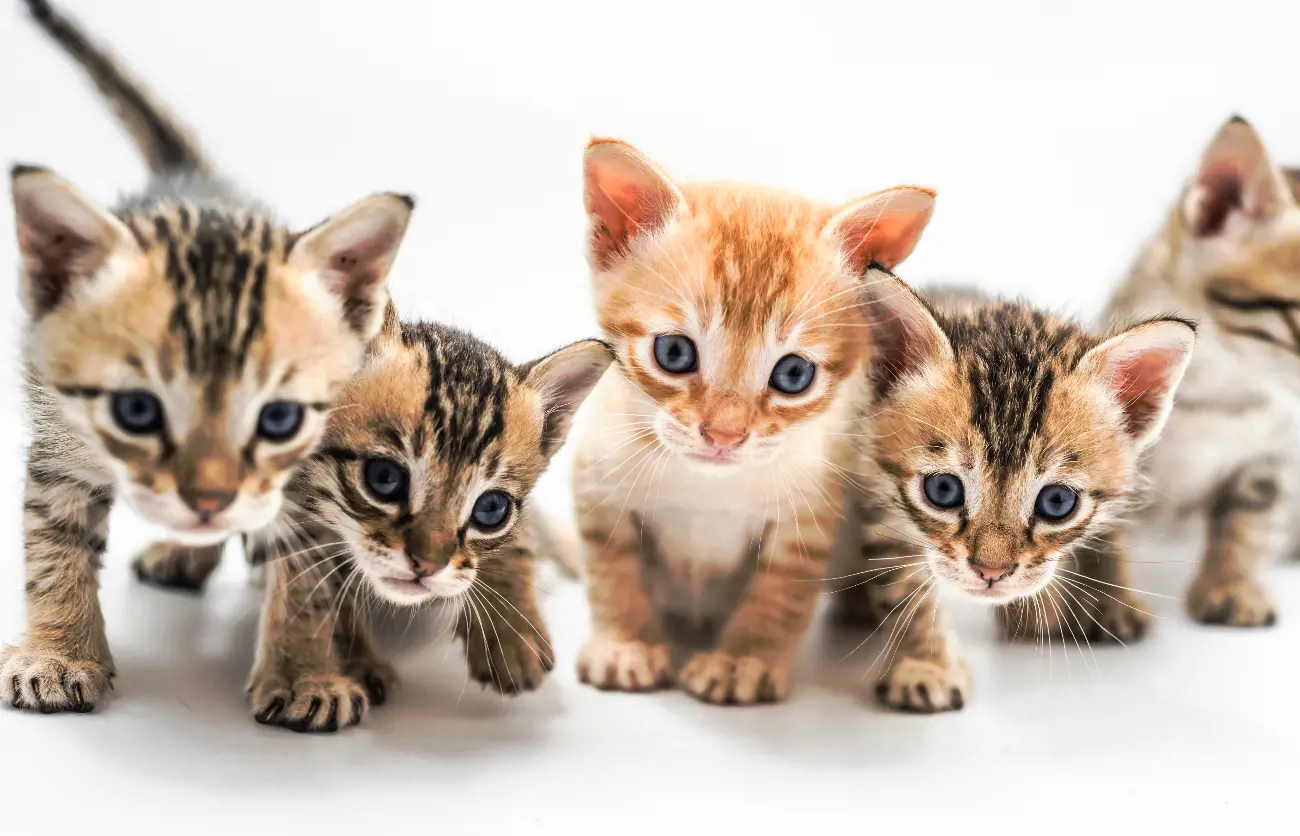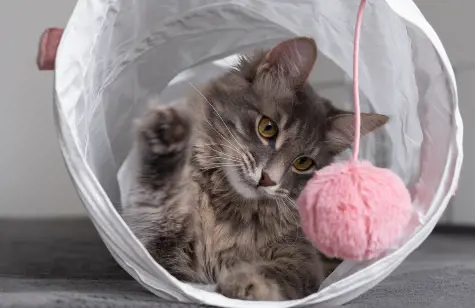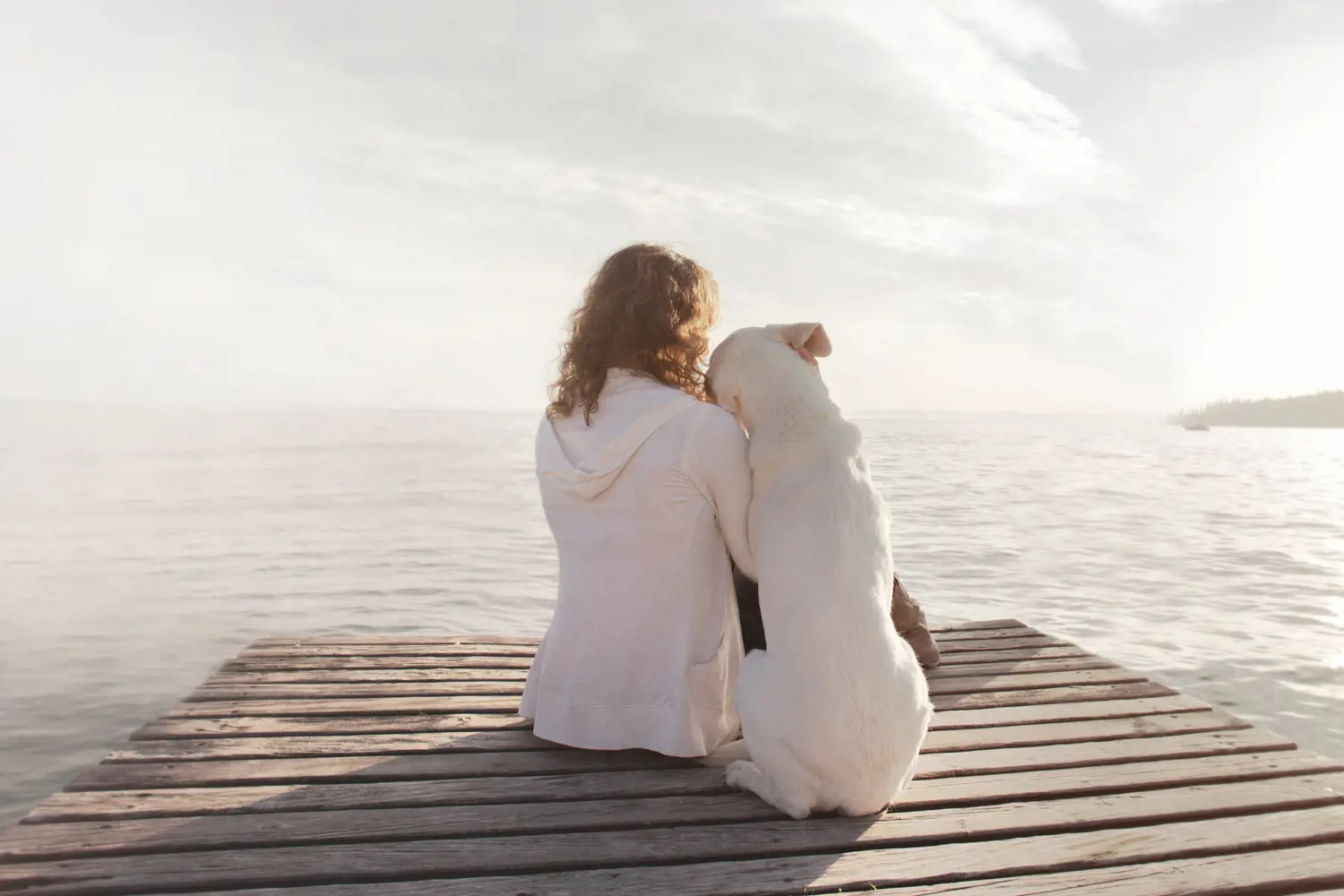Assess your living environment to ensure it is suitable for a feline, considering both space and potential hazards. Evaluate your lifestyle to determine if you can commit the necessary time for feeding, grooming, and play. Financial implications, including vet bills, food, and other essentials, should also be accounted for. Consider adoption options from shelters or rescue organisations, as they often provide valuable support and insights into the cat's history and behaviour.
What are the most expensive cat breeds?
22nd April, 2021
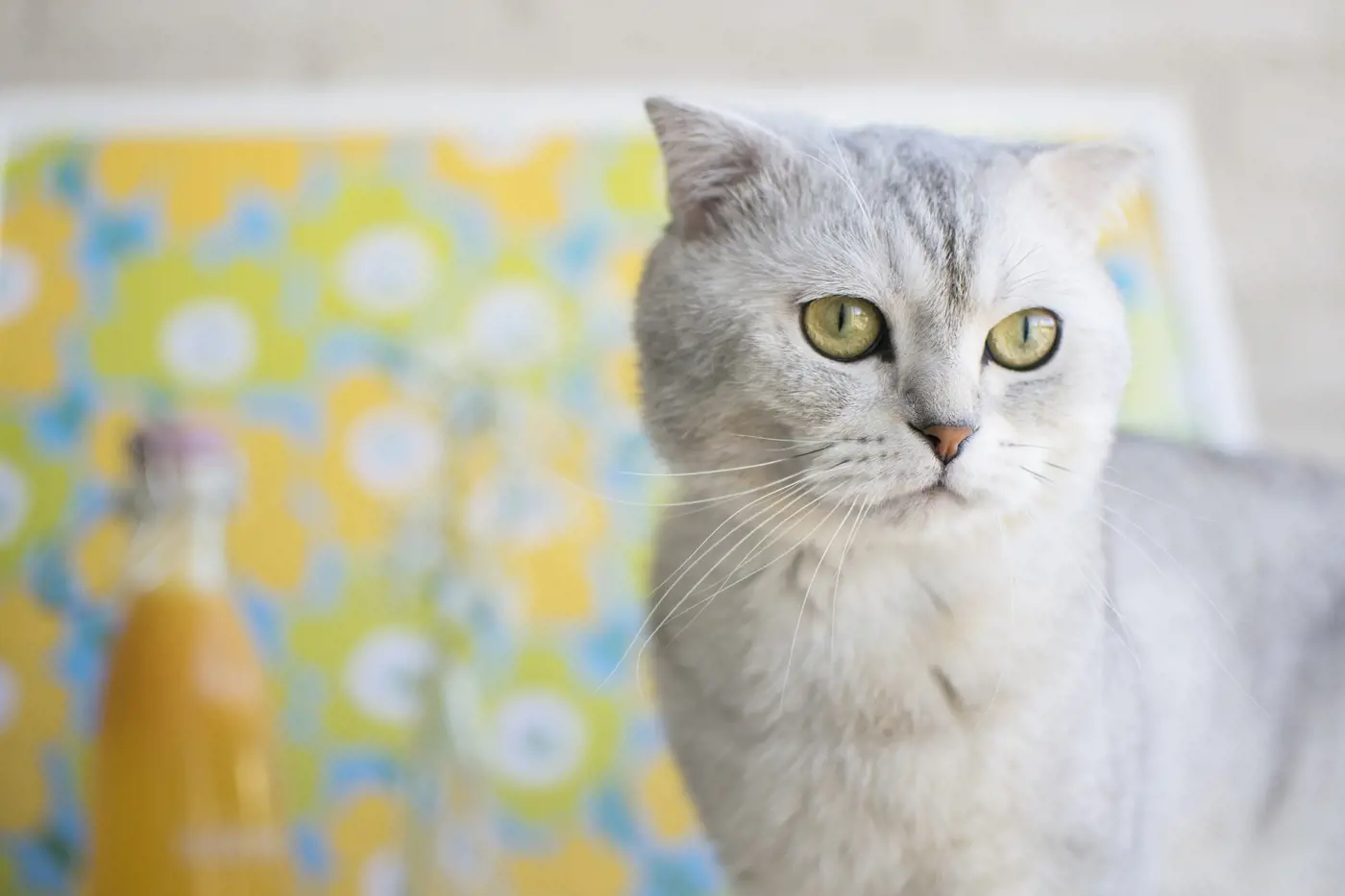
Welcoming a new cat or kitten into your home is a wonderful experience, but if you’re not prepared it can also be an expensive one. From regular grooming costs to vet and food bills, we all know cats can be a big drain on your budget.
But what about the cost of the cat itself? While a faithful cat can be picked up comparatively cheaply, some of the more sought-after breeds in the world can easily set you back over £1,000. So, what are the most expensive cat breeds in the UK, and do they have any particular health needs you need to be aware of?
Russian Blue - £1,000 - £1,300
With its brilliant green eyes and short, dense silver-tipped blue coat, the aristocratic Russian Blue cats are a star of the feline world.
They’re also known as the Archangel Cat owing to their origins in the Russian port of Arkhangelsk, located on the White Sea about 150 miles south of the Arctic Circle. Apparently, the cats boarded the boats with Russian sailors, arriving in England at the end of the 19th century.
Perhaps because of their regal looks and coolness towards strangers they have an undeserved reputation for aloofness. They are in fact playful, have a keen intellect, and are very loyal to their owners. Russian Blues are quite content with their own company while you are away but delighted to snuggle once you return.
Russian Blue care needs
Regular veterinary check-ups are essential to monitor their well-being. Providing mental and physical stimulation through interactive toys and playtime is also vital, as Russian Blues are intelligent and active cats.
Grooming needs are minimal but you’ll want to keep your Russian Blue’s coat in tip-top condition so a weekly grooming session is advised.
What considerations should I make when choosing a cat breed?
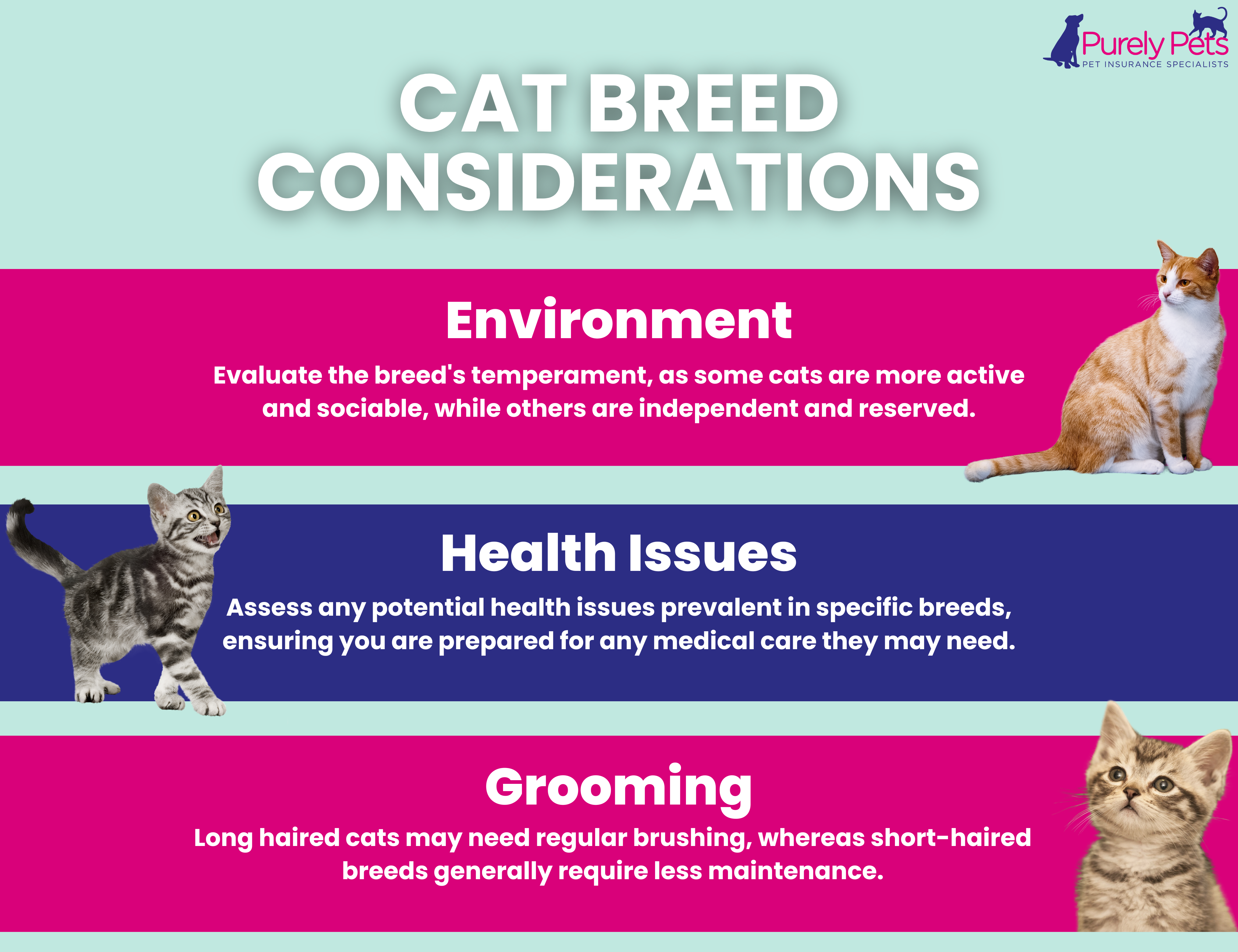
Maine Coon - £900 - £2,000
One of the very largest domestic cats you’ll come across, Maine Coon cats are distinguished by their hardy nature, large tufted ears, fluffy tail, and shaggy coat.
They’re also excellent hunters of mice! Despite their size, they’re considered to be the gentle giants of the cat world with a kindly disposition and a high level of intelligence.
With some large males weighing in at more than 20 pounds, they are fortunately not known as lap cats. But they are very affectionate, vocal, good-natured and enjoy the company of cat-friendly dogs, other cats and children. Indeed, they don’t always cope well with being on their own.
They are slow to physically mature, so probably won’t reach their full size until they are three to five years old. Generally playful, the males are more prone to clownish antics, while females are more likely to maintain their dignity. Learn more about the key differences in our blog on whether you should get a male or female cat
Maine Coon care needs
A weekly groom to keep that coat in the best condition and plenty of space to exercise are definite requirements.
Feline Hypertrophic Cardiomyopathy (HCM) which is a hereditary heart defect and hip dysplasia have both been noticed in this breed. But screening methods are available to minimise the likelihood of these problems. Check if they’re covered on your cat insurance.
British Shorthair - £800 - £2,400
The most popular pedigree cat in the UK today, British Shorthair cats can trace their origins back to the time of the Romans who brought them over to reduce the resident rodent population. Although the modern British Shorthair has become a bit clumsier (and lazier) over the years!
They are well known as easy going and affectionate creatures who are very trusting and soon become attached to their family (both humans and other animals). They don’t seem to be fond of being carried and prefer to keep all four paws safely on the ground.
Gently rounded and well balanced, the British Shorthair also has an adorably sweet and sincere face coupled with gorgeous large round eyes. They can be found in all major colour and pattern groups but most usually all one colour with copper eyes. And it’s their short, plush fur coat that’s probably their most defining feature with more fur per square inch than any other breed.
British Shorthair care needs
Care needs: The British Shorthair is a fairly easy feline to manage, although with their laid-back nature you do need to watch they don’t put on too much weight.
Breeders have worked hard to make this species resilient to previously common health issues such as PKD (Polycystic Kidney Disease). HCM can still be a problem with this breed and there is currently no DNA test available to screen for this in the British Shorthair.
If your cat does put on a bit too much weight then your vet might prescribe a special diet.
Sphynx - £1,000 - £2,000
The intriguing Sphynx has a hairless look that some people simply adore while others are less than enthusiastic about.
At a quick glance the Sphynx may appear to be hairless when in fact its body is covered in a soft down, similar to a peach. This is caused by a natural genetic mutation and the breed’s origin can be traced back to a hairless kitten born in 1966 in Canada.
They are extremely vocal, sociable and crave human attention. They’re also happy with pets and children but should probably not be kept as the only cat in a household
Sphynx care needs
Owing to their lack of a coat they can get sun burn and are not really appropriate as an outdoor cat. They also need to be bathed often as their body oils are not absorbed by their fur.
Fortunately, they seem to enjoy the water. As with most breeds of pedigree cats hypertrophic cardiomyopathy (HCM) has been reported but in general this breed is very resilient and not prone to any serious genetic or health issues.
Scottish Fold - £1,200 - £2,500
With their cute looks and funny antics, Scottish Fold cats are one of the most popular breeds of cat on YouTube and Instagram. But these social media darlings are only a comparatively recent addition to the cat world.
Indeed, the breed can easily be traced back to an obscure Scottish barn in the 1960s. A shepherd and cat enthusiast called William Ross spotted a cat with unusual folded ears and saw a once-in-a-lifetime opportunity to develop a new breed.
With its sad-looking but adorable face and a happy and inquisitive nature, they are great fun to hang out with. But make sure you’ve got plenty of cardboard boxes for them to play in
Scottish Fold care needs
Unfortunately, along with such popular traits there are also some serious health issues you need to be aware of before bringing one home. The same gene mutation that causes the ears to fold so adorably also affects the cartilage and bones throughout their body.
The degenerative joint disease osteochondrodysplasia is the most well-known problem. Another issue to look out for is Autosomal Dominant Polycystic kidney disease (AD-PKD) which causes cysts to form in the kidneys.
Bengal - £1,000 - £3,000
Thanks to their exotic spotted coat and striking muscular build, the Bengal cat looks like something that’s just sauntered in from some far away wild place. But despite their looks, the Bengal cat is in fact well domesticated and makes a fun pet who is very active and smart.
Indeed, they are now one of the most popular short-haired breeds in the UK despite only appearing on our shores many years ago.
Be warned however, life will never be boring with a Bengal cat around. They are naturally very inquisitive and can often be found jumping into aquariums, playing with switches, hanging from light fittings, and performing other crazy antics!
Bengal cat care needs
Care needs: The Bengal cat is a generally healthy breed and there are no diseases specific to the breed but watch out for a very rare condition called Peripheral Neuropathy.
Typically seen in younger cats, symptoms include flaccid paralysis of one or more limbs. If caught early it responds extremely well to treatment with corticosteroids.
A rare eye disease called Progressive Retinal Atrophy can also occur in some Bengal cats. Ask your breeder if they can do a DNA test to avoid producing kittens affected by this horrible condition.
Pedigree cats often have particular medical needs, they may require special diets and they’re at higher risk of theft than more common breeds.
Savannah - £1,500 - £4,500
Savannah cats are a hybrid of the wild African serval cat and a domestic Persian cat, and only appeared very recently. The Savannah cat's exotic lineage includes the Asian leopard cat, which contributes to its wild appearance and unique characteristics. This means this exotic breed is really quite different from the average domestic cat and even other well-known hybrids such as the Bengal.
They are not currently recognised by the GCCF in the UK, although that may change in the future. They are becoming increasingly popular and owing to their rarity can command some high prices. They are known as being very vocal, loyal, outgoing and active cats.
Savannah care needs
Savannahs need plenty of exercise and will require a well informed and well-prepared owner. Like all cats Savannahs are susceptible to bacterial and viral infections. They do not appear to suffer from any particular inherited diseases.
Buying from a reputable cat breeder
When buying a pedigree kitten, you need to make sure it’s coming from a reputable breeder who takes care of their animals and makes sure to check for any health problems. Cat lovers should ensure they are purchasing from breeders who prioritise the health and well-being of their animals.
Kitten checklist
The RSPCA has come up with a handy kitten checklist that you can use to find a healthy, friendly kitten and avoid buying from an irresponsible breeder. The checklist is the perfect way to ensure that your new pet gets off to the best start in life.
Another important point to remember before bringing any cat into your life, is to be realistic about the lifetime cost of the cat and what you can afford. It’s heart-breaking to hear of devoted owners having to give up their pedigree pet because they simply can’t afford their care.
Cat insurance
When you own such expensive animals it’s particularly important to get the right cat insurance to suit yours and your cats needs, to cover them from an early age.
After all, these fabulous creatures require a big investment in terms of both time, care and money, so you may want to consider cat insurance cover to protect you both in the case of any problems.
Purely Pets can provide you with an online quote for your cat within minutes. Get a quick quote today.
Policy benefits, features and discounts offered may very between insurance schemes or cover selected and are subject to underwriting criteria. Information contained within this article is accurate at the time of publishing but may be subject to change.
Frequently asked questions
Expensive cat breeds command high prices due to a combination of factors, including rarity, pedigree, and specific desirable traits. Breeding these cats often involves meticulous selection processes to ensure genetic purity and health, which can be costly and time-consuming. Additionally, the demand for unique physical characteristics and temperaments further drives up prices.
Helpful Pages
Recent Posts
Pet Insurance Quote
- 98% claims paid *
- Claims paid directly to vets
- 24/7 vet video consultations
- Interest free monthly payments
